
By Hans Dieter Post
Chess960 and the black hole
Astrophysics has a way of providing new explanations for certain phenomena in an entertaining way, even for the layman. Sometimes findings appear, are smiled at by colleagues and then disappear.
The Big Bang [1] is now common knowledge, but – to put it like that – the time before it, is exciting. There are several possible big bang scenarios.
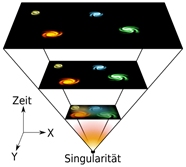 Our universe is still expanding after the last big bang about 13.5 billion years ago. Eventually it will fall back into the singularity, and then it will rumble again. But time, as we know and measure it, plays no part in this.
Our universe is still expanding after the last big bang about 13.5 billion years ago. Eventually it will fall back into the singularity, and then it will rumble again. But time, as we know and measure it, plays no part in this.
The first known big bang for what we know today as Chess960 happened in 1792.
Now it’s time to give credit at least to Tim Krabbé [2], Stefan Bücker [3], Thomas Brand [4] and, no joke, to (Johnny)[email protected]“ [5], who have made outstanding contributions to Chess960 by publishing what they know.
My motivation to look into the subject again came when I came across historical references in the announcement of the 1st German Chess960 Championship, which will be played in Berlin next February 2024, but these historical references were rather thin.
So I took a look at my digital archive [6] and tossed around some search terms. Relatively quickly, even if you don’t know the works mentioned, you come up with the end of the 18th century and a publication by an anonymous author in French with the title (amateurishly translated here):
“Superiority in chess – made accessible for everyone, especially for ladies who love to have fun” [7]
The Dutch version of the work was published at almost the same time and – Tarrasch could not have formulated it better or shorter – now bore only the title “The Chess Game”.

Philip Julius van Zuylen van Nijevelt
The Dutch general, nobleman and politician Philip Julius van Zuylen van Nijevelt [8] (1743 – 1826) was later identified as the author, but this is by no means proven. However, the assumption is more than reasonable. Perhaps this later French senator had too much free time in the midst of the turmoil of the French Revolution and did not want to offend his supreme employer by publishing a chess book instead of developing battle plans.
The work nevertheless attracted some attention in the chess world at the time, as it focused on the phase after the opening. In line with this, the author was convinced that a single position at the start of the game was boring and that different starting positions created by drawing lots or placing the pieces at random could be more interesting. [5]
Nevertheless, this first idea of Chess960 disappeared again into a black hole and was only rediscovered for the public fifty years later by a Dutch baron, Elias van der Hoeven [9] (1778 – 1858).
He was, what a coincidence if the source of 1792 is still considered anonymous, a nephew of the presumed author and now, having reached the last part of his life, seemed to want to devote himself more to chess and here in particular to follow his uncle’s ideas.
Based in Mannheim [10], he “ambushed” his guests, including Aaron Alexandre [11] and also Tassilo Heydebrand and der Lasa [12], with this idea and played a few games with the basic position of the pieces drawn. Now the topic went “viral”, as it is called today.
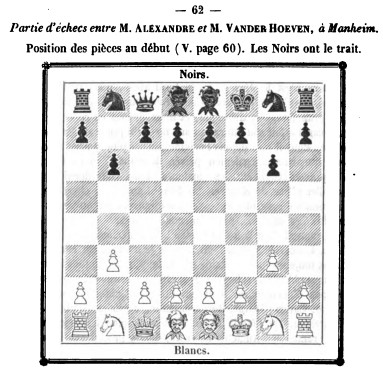
Both Le Palamède [13] and Bilguer [14] published games by these chess stars of the time, and even a tournament with eight participants took place in Amsterdam in 1852 5. But then van den Hoeven died and with him the idea of early Chess960 sank back into a black hole.
Strangely enough, no one had thought of a name for it yet. This was to change with the next little big bang, which, however, was drowned out by a much bigger one.
In 1915 the most important German-language chess newspapers published an announcement about “Two new war games: ‘Freischach’ and ‘Matt'” [15].
On eight pages, twelve in total if you count the cover, the author “G. Capellen” from Hanover presented his ideas to the editors of the chess press, whereby the latter, as a card game, is completely uninteresting for our topic, and the former, the “Freischach”, which in the end practically violates common chess on only two pages, is more so. Why it was also called “Baroque Chess” is not explained in detail.

Capellens pamphlet
As sure as our Dutch general is the Anonymous of 1792, the author of the pamphlet was probably the German composer and musicologist Georg Capellen (1869 – 1934) [16].
Capellen thought it appropriate to give his little pamphlet the imaginative title ‘War Games’ and to dedicate it to Field Marshal Paul von Hindenburg. And 50 pfennigs had to be raised in 1915.
However, a Capellen, especially one from Hannover, is not to be found in the German chess journals on account of his chess achievements, and the attention given to him is also given to his “new game”, namely very little.
Though “Free chess with innovative piece development and avoidance of monotonous opening moves” was designed to make chess more interesting and give better chances to those who have not absorbed opening theory.
While the Wiener Schachzeitung can still find something positive to say about the two-pager, the Deutsche Schachzeitung doesn’t like it, while the Deutsche Wochenschach abstains from voicing an opinion.
The Thuringian priest Otto Koch, well known among chess players, gives Capellen’s idea two thumbs down in the Deutsche Schachblätter [17], and rightly so: in addition to the free positioning of the pieces, there is also a change in value, depending on whether a knight should stray onto the starting square of a rook, for example.
“I doubt that this new way of playing chess will be able to establish itself anywhere; like so many similar innovations that have come and gone, it will sink into the orcus of oblivion and do no harm to the old game, which is so infinitely rich in combinations that remain unknown only to amateurs and bunglers.”
Since Hindenburg was also misused as a publicity figure, the work was quickly given the amen.
And into the black hole! After all, the world had more important things to do at the time, and until 1918, than devote itself to new game ideas.
When the Treaty of Versailles was signed and the Spanish flu had taken its toll, but also passed its peak, who was to “invent” the new free chess? A Swiss, of course. But the Deutsches Wochenschach coined the term “Permutationsschach” for this new form of chess [18].
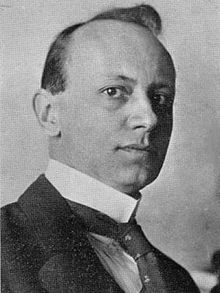
Erich Brunner [19] (pictured right, 1885 – 1938), an “artist of the chess problem”, born in Vogtland but of Swiss descent, swept up the pieces of the earlier versions of Chess960 and brought some order into the stable. By today’s standards, however, his approach would have been called “Chess5040”, because his calculations would have resulted in so many different starting positions.
He also used the term “free chess”, which was discussed at length in several issues of the Schweizer Schachzeitung. The negative critics were clearly in the majority.
Brunner in particular tries to emphasize the compatibility with the generally accepted rules of chess or, where this is not the case, for example with castling, to play down the problem.
When his idea was first published he also referred to the new world champion Capablanca from Cuba, who had just dethroned Lasker in Havana. At the same time, both feared the “draw death” of the game, and ideas began to emerge to at least have the bishops and knights swap their starting positions, if not to introduce a new piece.

The British Chess Magazine [20] comments on the “fate of chess” on a cover page, but sees no need for such measures and finally ends with
“This is Cubism, we prefer Cuba!”
Well then: Cheerio!
Nevertheless, this form of “free chess” remains a little longer in the chess community, and in Switzerland in particular tournaments with this type of chess are organised. [19].
In workers’ chess, where the fee was often waived in order to retain members, a theory-free version of chess, i.e. without expensive literature, would have been very welcome. However, there are no specific references to this in the publications. With the exception of this passage in the Swiss Workers’ Chess Calendar of 1937:

Picture on the right: Following Fr.Grosek, Hannover(sic!) [21]
From 1925 the Deutsche Wochenchess became part of the new “Radiochess” which, as the name suggests, was mainly devoted to the new medium of radio.
Willibald Roese (*1894 – +?), publisher and pioneer in this field, and at the same time chess radio director of the Norddeutscher Rundfunk, gave a radio lecture on 1 January 1925 on the subject “The Future of Chess” [22].
He concludes his lecture with a positive attitude towards free chess:
It is understandable and human that the professional masters and breeders of opening variations are not very sympathetic to such ideas. Ultimately, however, these gentlemen are not an end in themselves, but a means to an end.
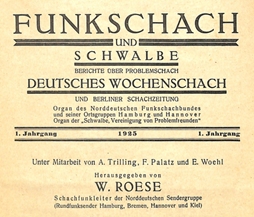
Picture left: Cover page Funkschach 1925 Issue 1
There are more on-air talks on the subject, and even a match between Hamburg and Hanover (!). Capellen must have listened to the radio!
Only a few years later the world sank back into the chaos of war and the time for free chess was over again. In Germany “Wehrschach” [23] was more on the agenda.
The post-war years also left no room for free chess spirits; after all, from 1946 to 1948 the chess world did not even have a World Champion.
And as long as ideas such as “Freischach” can only be traced back to more or less personal supporters and not to institutions, i.e. associations, they are not destined to have a long life.
For more than 70 years after Brunner’s “Freischach” of 1921, Chess960 disappeared into a black hole again, and it would take a chess god to trigger the next big bang.
At the beginning of the 1990s nobody really had an Erich Brunner on their radar; they had just been beamed back to the 1970s after Bobby Fischer played Boris Spassky in a “rematch” in Sveti Stefan, Yugoslavia, in 1992.
Only a year later the term “shuffle chess” was haunting the gazettes, and not only those of chess, and none other than Bobby Fischer carried this banner in front of him [24].
Finally, the great champion himself called for a big bang in South America, where an exhibition fight was to be staged in Buenos Aires as part of a major PR campaign. The press conference went well, but sponsoring did not [25]. Had Fischer’s lustre faded?
Maybe the problem was in the name, which people thought they had finally found: FischeRandom!
Fischer was already facing two problems at the time: the US tax authorities were after him. Secondly, his anti-Semitic remarks were now coming back to haunt him [26]. The name was difficult to market and this put off sponsors.
However, the new FischeRandom was already well adapted for compatibility with the existing FIDE rules, i.e. the two bishops were always of different colours and valid positions were only those where the king was in the starting position between the rooks. These rules allowed 960 different starting positions and number 518 of these 960 possibilities is the well-known starting position of classical chess. And importantly, the starting positions of Black and White are mirror symmetrical, as in classical chess. This meant that all the details of piece movement defined by FIDE could be applied without further adaptation or exception.
It’s easy to imagine the attitude of the great minds towards Chess960: Yards and yards of opening literature virtually meaningless and hard to sell.
But a small club from the Frankfurt area, well networked, with strong ideas and a flair for what is feasible, took a liking to this new form of chess: The Chess Tigers.

Jens Beutel (1946 -2019)
After a strong rapid open in Frankfurt an even bigger one was established in Mainz [27], following the call of the mayor of Mainz, Jens Beutel, and in the search for new highlights and events FischeRandom was successfully taken up, including a discussion about the name and branding of this form of chess.
In 2001, Michael Adams and Peter Leko played a Chess960 match in Mainz, and this was followed by a top-level Chess960 Open, which at its peak had over 260 participants. There was even an additional youth open.
Without the actual main event, the ORDIX Open, named after its main sponsor and a regular rapid open that was even called the unofficial World Rapid Chess Championship, there would certainly not have been nearly as many title holders in the Chess960 tournament. The motto was: while we are here, we might as well try something new.
In the frenzy of this new wave, FIDE was virtually forced to act, as many, including top grandmasters, had appealed to the world governing body to include Chess960 as a new appendix to the General Rules, just like Blitz and Rapid Chess. This was a milestone in 2009 and this last big bang should have a lasting echo. But there was already a crisis in Mainz on the banks of the Rhine.
And there was a catch: Chess960 tournaments were almost exclusively rapid tournaments, there were few Chess960 tournaments with a classical time limit, and when there were, they were not very well frequented.
An exception might have been the Frankfurt City Championships in Chess960 [28], which took place from 2011 to 2018. However, the hoped-for number of participants fell far short of expectations.
Dr Matthias Kribben, originally from the Rhine-Main region, who became head of the Berlin Chess Association in 2004, believed in Chess960. Thanks to him, a national Chess960 championship was organised for the first time in 2005 – an individual and a team tournament.
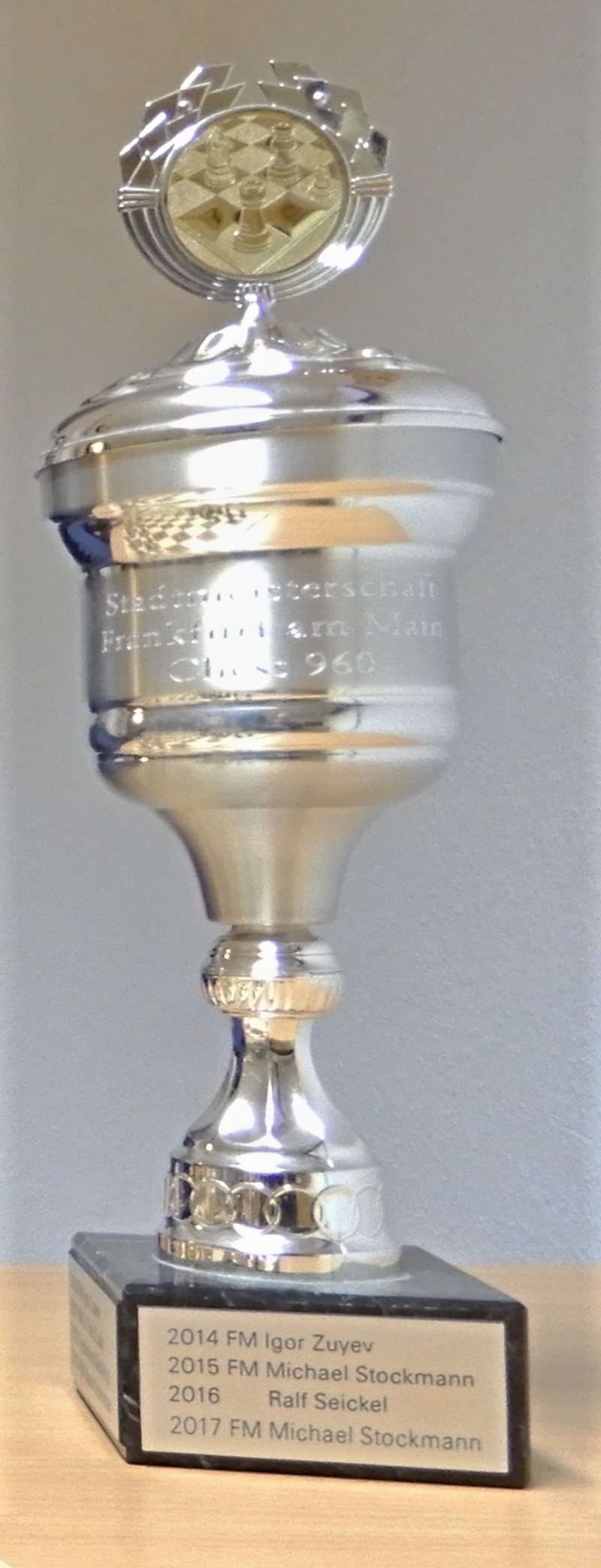 Picture: Cup Chess960 Frankfurt, private archive
Picture: Cup Chess960 Frankfurt, private archive
Very few people today, including the leaders of the association, know that almost at the same time a state championship [29] was also being played in Hessia. Even at the next Hessian championship the subject was not discussed.
Much depended on how individual decision-makers or functionaries approached the issue. In any case, the right man was in Berlin at the right time.
But details of these early Chess960 tournaments are hard to find, it seems easier to persuade Dutch generals and musicologists from Bad Salzuflen to reveal their secrets from archives.
So what’s left of this Chess960 hype?
The small circle of Chess Tigers lost the network that provided the strength for the organisation of the Mainz Chess Classic tournaments. The decisive factor was the political bickering in Mainz city politics, which cost Jens Beutel his job as mayor. Finally, sponsorship money was no longer as easy to come by as before, especially for Chess960, and so 2010 was the end in Mainz.
After internal disputes in the sponsoring organisation, all efforts to promote Chess960 were abruptly stopped, although more than 100, albeit smaller, rapid chess tournaments [30] were held regularly between 2011 and 2019.
Isolated local efforts, such as in the district of Frankfurt, where Chess960 was even included in the tournament rules, albeit grumblingly, were stopped by a board decision for “cost reasons”.
Some clubs in Germany, which were once infected by the Mainz virus, still try to organise championships. But it has never reached pandemic proportions.
Unlike in Fischer’s time in the 1990s, however, today’s world champions are more open to the subject of Chess960 and do not see their staked claims threatened.
While Karpov and Kasparov always relied on their phenomenal opening knowledge and perceived Chess960 more as a threat, Magnus Carlsen, also a former Mainz participant, was certainly aware that Chess960 offered possibilities.
Hans D Post, January 2024
From nameless to CMLX:
| From | |
| 1915 | Freischach (Free Chess), Barockschach (Baroque Chess) |
| 1921 | Permutationsschach (Permutation Chess) |
| 1992 | Fischerschach |
| 1996 | Fischerandom |
| 1998 | Fischer Random Chess |
| 2001 | Schach 960 |
| 2002 | Chess960 |
| 2019 | Chess9LX |
| 1.April 2024 | CMLX |
Sources:
[1] Wikipedia entry about the Big Bang
[2] Tim Krabbé’s website about chess
[3] Kaissiber, 02/1997, p. 62, „Rückblick aufs Fischerschach“
[4] SCHACH, 05/2021, pp. 48ff „Die Vorläufer des Chess960“
[5] La Superiorite Aux Echecs: The first chess book of endgame theory by van Zuylen van Nyevelt
[6] Non-public digital archive at schach-chroniken.net
[7] Digital copy in Delft of La Superiorite Aux Echecs
[8] Philip Julius van Zuylen van Nijevelt at Wikipedia
[9] Elias van der Hoeven at Wikipedia
[10] According to the Wikipedia he died in Manheim bei Kerpen, but this might be an error in the Wikepedia article.
[11] Aaron Alexandre at Wikipedia
[12] Tassilo von Heydebrand und der Lasa at Wikipedia
[13] First chess magazine, published in Paris in 1836, also reported on other games such as billiards etc.
[14] Alias for “Das Handbuch des Schachspiels”, conceived and begun by Paul Rudolf von Bilguer, completed after his early death by von der Lasa.
[15] Online copy of “Zwei neue Kriegsspiele”
[16] Georg Capellen at Wikipedia
[17] Deutsche Schachblätter, 16/1915, p. 182, „Kriegsspiele“
[18] Deutsches Wochenschach, 29/30/1921, p. 170, „Das Permutationsschach“
[19] Erich Brunner at Wikipedia
[20] British Chess Magazine, 07/1921, p. 1, „The Fate of Chess”
[21] Schweizer Arbeiter-Schachkalender, 1937, p. 107
[22] Lecture, also published in Funkschach, 01/1925, and Schach- Funkkalender, 1926, p. 28
As a chess Gauleiter Roese from Hamburg was also a party member and therefore hardly to be found in a position of responsibility in the chess scene after 1945.
[24] In comments on his website and in interviews, Tim Krabbé criticises Bobby Fischer for virtually hijacking the idea of van Zuylen van Nyevelt and others.
[25] Schachmagazin 64 / Schach-Echo, 15/1996, p. 418, „Fischerschach abgesagt!“
[26] stern.de: Bobby Fischer: wie aus dem Schachgenie eine Persona-non-grata-wurde
[27] Weltmeister im Chess960 at Wikipedia
[28] Summary of the Frankfurt City Championships in Chess960 at schach-chroniken.net
[29] KARL Spezial, 01/2005, p. 11, „1.Offene Hessenmeisterschaft im 960 Schach“




